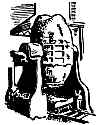|
Now to give you a little background of the problem. Iron, as you know, is one of the elements - like gold, silver, copper and tin. Steel is an alloy of iron with relatively small amounts of such material as carbon, nickel and manganese, just as bronze is an alloy of copper and tin. Bessemer's idea was this. Since steel is an alloy of iron and other materials, why not start with pure iron and then add measured amounts of the alloying materials? Now pure
iron is hard to get because when the ore is reduced to
pig iron, some of the original impurities remain, together with the
carbon from the smelting process.
 The new experiment which Bessemer tried was a method of getting
pure iron. He melted pig iron in a crucible and blew air through the
molten metal to burn out the carbon and the other impurities.
The new experiment which Bessemer tried was a method of getting
pure iron. He melted pig iron in a crucible and blew air through the
molten metal to burn out the carbon and the other impurities. When the air was turned on, a great shower of sparks arose for several minutes and then stopped. Bessemer found this process gave almost pure iron. Success the first time! For a second test, he used a crucible which would hold half a ton of molten pig iron, and with the aid of a very powerful engine-driven blower the air was forced through. With a tremendous roar, the sparks poured out as in the first test. Now, just as the sparks stopped, Bessemer added a calculated amount of the alloying material and, as a result, he had a good quality of steel. Success again! |








